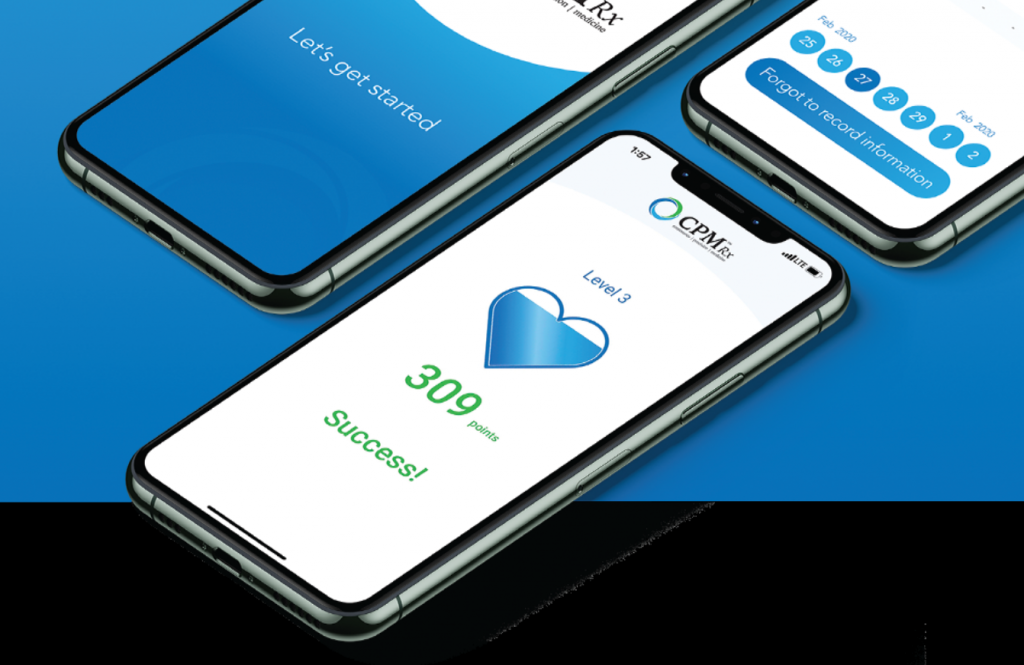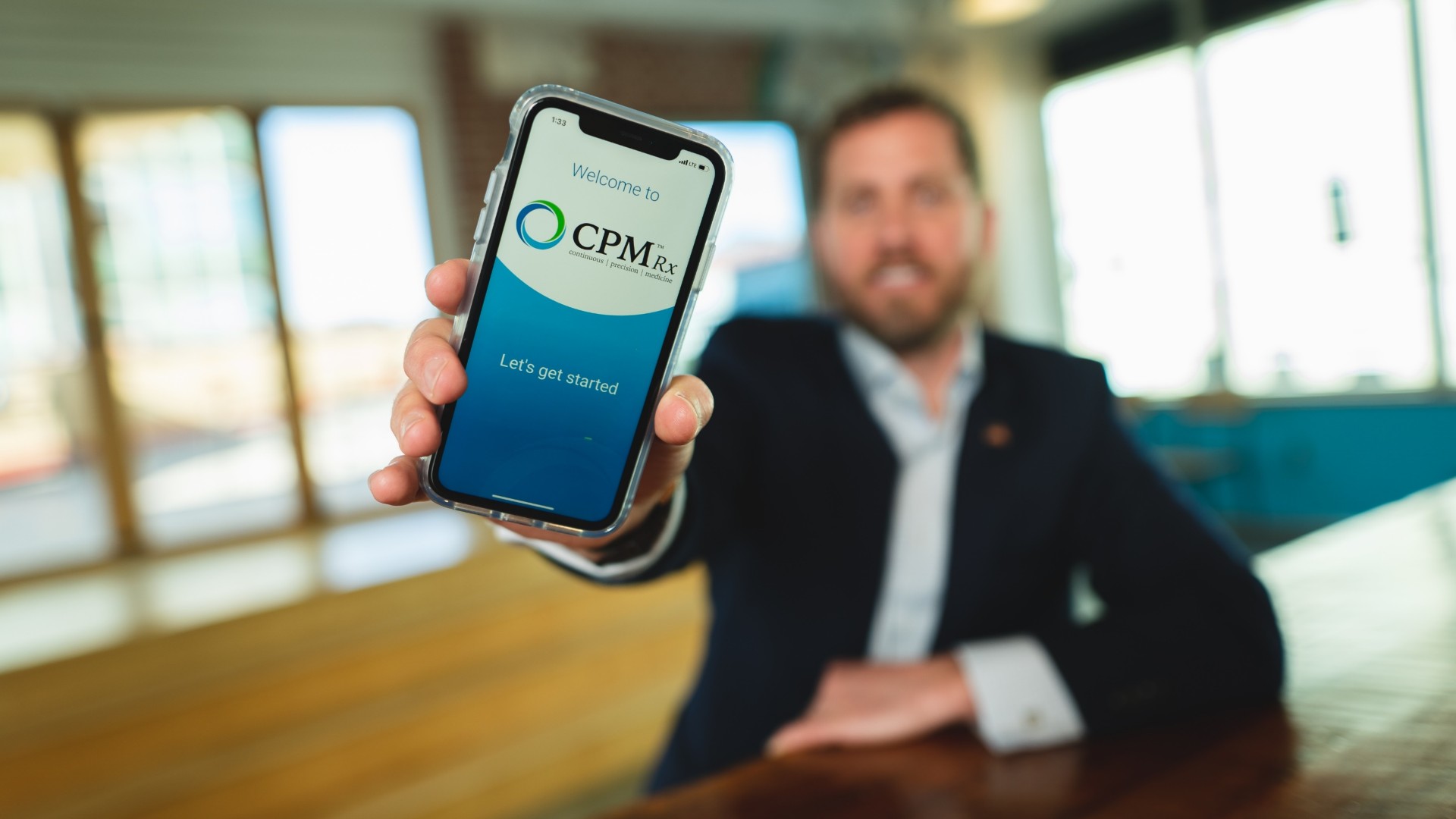
The CPM RX app aims to prevent opioid misuse before it begins. (Photo courtesy of CPM)
As the opioid crisis continues to devastate communities across the nation, a team of undergraduate students from Temple University’s Fox School of Business recently participated in an ambitious effort to help address the epidemic.
As part of a unique undergraduate capstone course, three students from the Fox School collaborated on a business case analysis for a mobile application developed by Continuous Precision Medicine (CPM) that provides a patient’s real-time pain management data to medical staff.
The CPM RX app aims to prevent opioid misuse before it begins and ensures that patients receive adequate pain relief without falling into patterns of dependency. This technology is particularly important in postoperative care, where the risk of long-term opioid use is heightened.
“Our company had a lot of work that had already taken place or was taking place within the clinic space demonstrating the technologies and therapeutic merit,” says Steven K. Walther, chief executive officer and co-founder of CPM.
“Once we were able to understand how impactful it was for providers to get pain-related information from patients who were using the mobile app, we turned to the Fox School to understand the economics of it.”
Experiential learning at Fox
During the spring 2024 semester, Jamey Schultz, Carlee Ingelido and Liam Gorham were enrolled in a capstone course taught by adjunct instructor Robert Murray. The course is designed to match students with companies, like CPM, to solve real-world problems on a pro bono basis.
The trio collaborated to analyze the potential cost-savings benefits and economic impact for not only CPM, but also examined the effects on risk reduction efforts related to opiate misuse and the overprescribing of pain medication.
“When a person is at home recovering from surgery and they’re in pain, or even if they’re not in pain, they can open up the mobile app and report their pain score and report what, if any, medication they took,” Walthers says. “Maybe they decide that they’re just going to take Tylenol. Or maybe the pain is more and they decide to take an opioid. The patient reports that on the app.”
The information is then shared via a digital journal with the prescribing medical professional. This allows physicians and their teams to see trends based on patient reporting.
“As an example, one OB-GYN department saw that it really didn’t need to prescribe as many pills as it had been prescribing because patients were not using them,” Walthers says. “So, you change your prescription from 25 opioids to 16 opioids and then those extra pills are no longer out in the community to be stolen or sold or whatever bad things happen that can lead to addiction.”
“We saw a gap in how pain management is handled, especially for those at risk of addiction“

Jamey Schultz
Fox class of 2024
Dedication to the project
Being part of the effort to reduce the potential for opioid dependence and addiction was a driving force for the Fox students.
Schultz immediately recognized the potential of this application to change lives.
“We saw a gap in how pain management is handled, especially for those at risk of addiction,” Schultz says.
Ingelido also clearly saw the urgent need for widespread use of the mobile app.
“The CPM app provides a way to monitor and adjust treatment in real-time, which can prevent misuse from the start,” she adds.
Advocating for change
Understanding the importance of integrating this technology into existing healthcare systems, the Fox students connected with a range of community partners, including Temple University’s College of Public Health, to ensure they gained the knowledge and insight needed to meet their goals.
“It’s encouraging to see our student body recognize the need for interdisciplinary work and draw from the various areas of expertise and knowledge here at Temple University,” says College of Public Health Dean Jennifer Ibrahim. “It is important to balance treatment and prevention. This type of collaboration could lead to change that could greatly benefit the health of our communities.”
They also worked closely with Temple University Hospital, a major provider of care in North Philadelphia, to discuss potential implementation.
The hospital, already at the forefront of innovative healthcare practices, was receptive to the idea. The students worked alongside hospital administrators and healthcare providers to pilot the app with a group of postoperative patients.
The students also took their advocacy efforts to the next level by engaging with Philadelphia city officials. In meetings with the local policymakers, they highlighted the potential of CPM RX’s technology to address the opioid crisis on a larger scale.
Their goal is to see the app adopted across the city’s healthcare providers, particularly in areas hardest hit by the epidemic.
City officials expressed interest in exploring the application further and discussed its potential use as part of the city’s broader opioid response strategy. No decision has been made.
“We wanted to do something that mattered. We’re proud to be part of a solution to such a significant problem.“

Carlee Ingelido
Fox class of 2024
Impact beyond the classroom
Experiential learning is the hallmark of an education at the Fox School. The school strives to provide opportunities to collaborate with both internal and external partners to use business knowledge to improve the lives of others.
“I believe our business school has an obligation to use research and resources to improve the lives of those who live in our communities,” says Fox School Dean Chip Hunter. “Fox students recognize that in order to become great business leaders, they need to embrace opportunities to collaborate and gain knowledge, much like these students did with Dean Ibrahim and the College of Public Health. I’m grateful for the work these students have done.”
For the students, the experience goes far beyond a capstone course requirement.
“We’re excited about the potential to make a real impact,” Schultz says. “This isn’t just about technology; it’s about saving lives.”
The students’ work with CPM and Temple University Hospital demonstrates the power of collaboration between technology developers, healthcare providers and community advocates.
“We wanted to do something that mattered,” Ingelido says. “We’re proud to be part of a solution to such a significant problem.”
